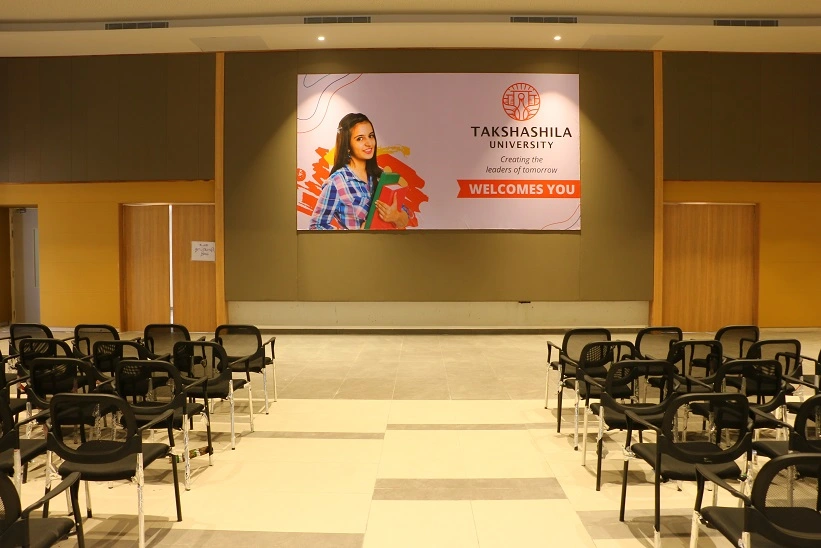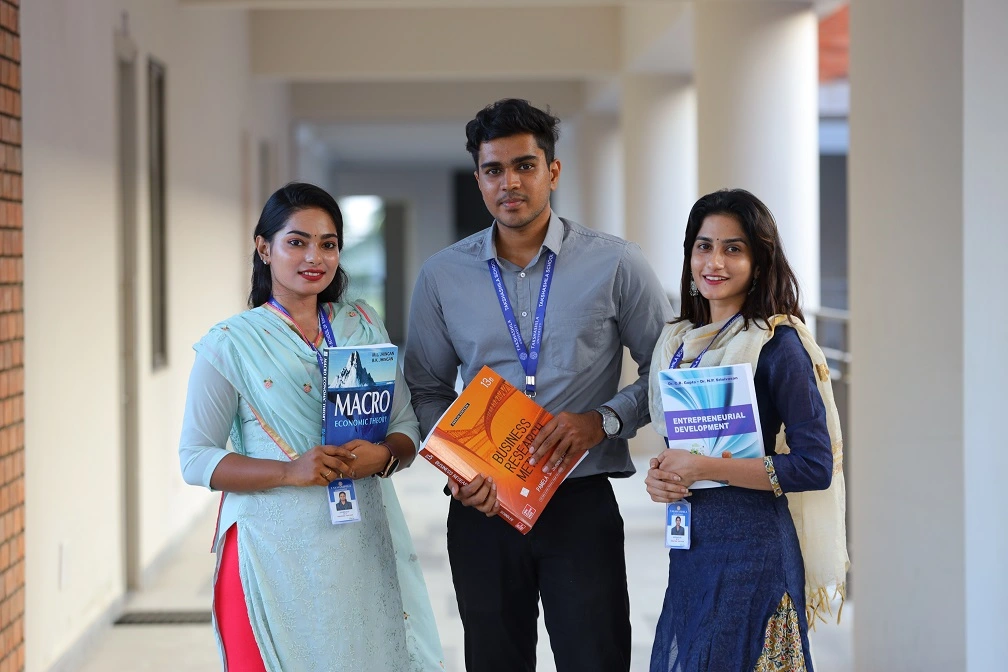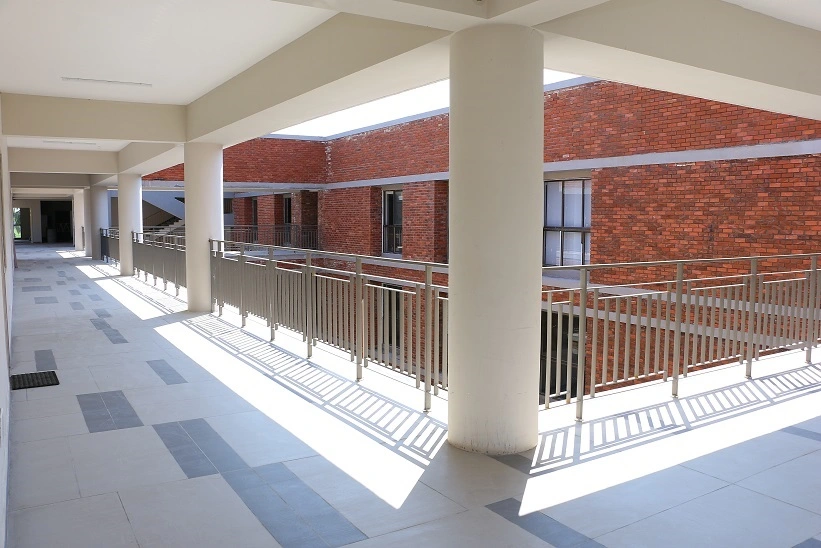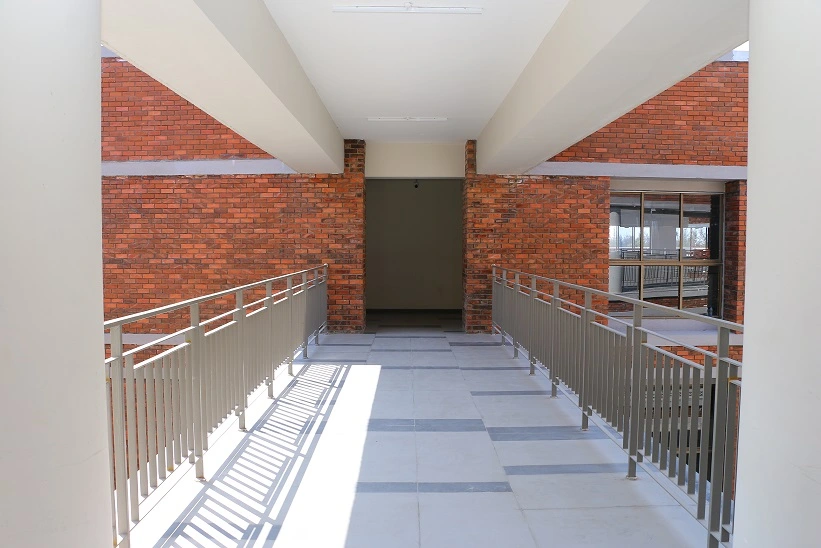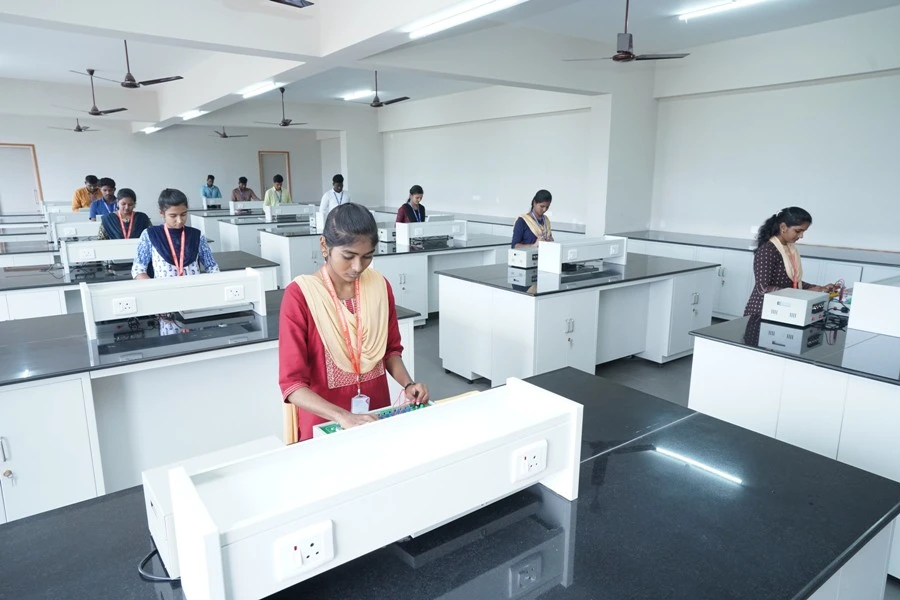B.Sc. Physics
- Hands-on Training
- Faculty with International Experience
- Advanced Curriculum
- Upto 100% Scholarship based on merit

About the Course
The B.Sc. in Physics is a three-year undergraduate program designed to provide you with a solid foundation in both theoretical and experimental physics. This comprehensive course covers various areas of physics, including mechanics, thermodynamics, electricity and magnetism, optics, and solid-state physics. You will also explore interdisciplinary topics in mathematics, chemistry, and computer science to strengthen your understanding of physics principles.
Throughout the program, you will develop the skills needed to apply fundamental physics concepts to real-world problems, while also gaining hands-on experience in laboratory work. This course prepares you for careers in research, industry, education, and further studies in physics and related fields.
Course Curriculum

Year 1
In the first year, you will study the basics of mechanics, properties of matter, and foundational principles of physics. You will also learn about fundamental concepts in environmental studies and organic chemistry. The focus will be on building a strong understanding of classical mechanics, the properties of matter, and thermodynamics.
Key Subjects:
- Mechanics and Properties of Matter
- Environmental Studies
- Organic Chemistry
- Basic Electronics
- Introduction to Physics Lab Techniques
Year 2
In the second year, you will deepen your understanding of subjects like solid-state physics, classical mechanics, and nuclear physics. This year introduces the applications of physics in real-world contexts, such as biophysics and renewable energy. You will also explore digital electronics and atomic models, including atomic spectra.
Key Subjects:
- Solid State Physics
- Classical Mechanics and Relativity
- Nuclear Physics
- Biophysics and Radiation Science
- Renewable Energy
- Digital Electronics
Year 3
In the final year, you will engage with more advanced topics such as advanced optics, mathematical methods in physics, and instrumentation. This year also includes a focus on physics entrepreneurship and its applications in modern industries. You will conduct research projects and participate in internships, gaining practical experience to further your career in the field.
Key Subjects:
- Atomic and Molecular Physics
- Advanced Optics
- Instrumentation
- Mathematical Methods in Physics
- Entrepreneurship in Physics
- Internship and Research Project
Programme Outcomes (POEs)
Upon completing the B.Sc. in Physics, you will acquire the following practical and professional competencies:
Proficiency in Physics Principles
You will gain a solid understanding of fundamental and advanced physics concepts, such as mechanics, electricity, magnetism, thermodynamics, and optics. This knowledge will enable you to analyze and solve real-world problems effectively.
Hands-on Research Experience
You will gain practical skills in conducting laboratory experiments, analyzing data, and applying theoretical concepts to experimental physics.
Problem-Solving Abilities
You will develop critical thinking skills to tackle complex scientific challenges, applying physics concepts to a wide range of practical scenarios
Technical Expertise in Instrumentation
You will become proficient in understanding and using various measuring instruments, calibration techniques, and standards of measurement in physics experiments.
Sustainability in Physics Applications
You will learn to apply physics knowledge in creating sustainable technologies, focusing on eco-friendly solutions for energy, pollution, and environmental challenges.
Leadership and Innovation
You will develop the skills necessary to lead projects, manage research initiatives, and innovate within the field of physics, including in industrial and entrepreneurial contexts.
Programme Outcomes (POs)
The B.Sc. in Physics will help you achieve the following broader learning outcomes:
PO1: In-Depth Knowledge of Physics
You will develop a deep understanding of various branches of physics, including mechanics, thermodynamics, optics, nuclear physics, and more, enabling you to apply these principles in various settings.
PO2: Analytical and Research Skills
You will refine your ability to conduct research, analyze scientific data, and present findings in a clear, professional manner.
PO3: Strong Problem-Solving Skills
You will enhance your critical thinking and problem-solving capabilities, preparing you to address complex issues in both theoretical and applied physics.
PO4: Effective Communication and Teamwork
You will develop excellent communication skills, enabling you to collaborate effectively with peers, faculty, and industry professionals on research projects and in laboratory settings.
PO5: Application of Physics in Industry and Research
You will be prepared to apply physics concepts in real-world applications, from research and development to industrial settings, focusing on the application of physics in solving practical challenges.
PO6: Ethical and Responsible Physics Practices
You will gain an understanding of the ethical considerations and responsibilities in physics, particularly in the areas of environmental impact, sustainability, and technological innovation.
Programme Specific Outcomes (PSOs)
The Programme Specific Outcomes focus on the technical and industry-specific skills you will gain through this course, enabling you to excel in the field of physics.
PSO1: Expertise in Mechanics and Properties of Matter
You will gain a deep understanding of classical mechanics and properties of matter, with the ability to apply Newton's laws of motion and other fundamental principles to solve real-world problems.
PSO2: Understanding of Atomic and Molecular Physics
You will acquire a thorough understanding of atomic structures, atomic models, and atomic spectrums, with practical knowledge of how atomic and molecular phenomena shape the behavior of matter.
PSO3: Proficiency in Thermodynamics and Heat Transfer
You will understand thermodynamic principles and the application of various thermometers and temperature measurement methods, including their role in different scientific and industrial settings.
PSO4: Mathematical Methods in Physics
You will develop expertise in using complex numbers and mathematical methods to solve equations in various branches of physics, such as electricity, magnetism, and quantum mechanics.
PSO5: Instrumentation and Measurement Techniques
You will be proficient in the history, components, and techniques of instrumentation, understanding measurement errors, standards, and calibration methods used in scientific experiments.
PSO6: Specialization in Optics and Optics Principles
You will gain expertise in the concepts of geometrical optics, image formation, magnification, and related topics, preparing you to apply these principles in research and industry.
Career Scope
Upon completing the B.Sc. in Physics, you will be well-equipped to pursue a variety of roles in the scientific, engineering, and manufacturing sectors. The demand for skilled physics graduates is high, with numerous career opportunities both in India and internationally.
Lecturer/Teacher
- Role: Teaching physics at the high school or college level, preparing and delivering lectures, and guiding students in their learning.
- Salary: ₹3,00,000 to ₹6,00,000 per annum.
Research and Development Officer
- Role: Conducting scientific research in areas like materials science, quantum mechanics, or environmental physics, contributing to innovations in various industries.
- Salary: ₹5,00,000 to ₹10,00,000 per annum.
Quantity Surveyor
- Role: Estimating the cost and quantity of materials needed for construction or manufacturing, applying physics principles to ensure accurate calculations.
- Salary: ₹4,00,000 to ₹8,00,000 per annum.
Quality Control Officer
- Role: Overseeing the quality of products in industries such as manufacturing or electronics, ensuring compliance with standards and specifications.
- Salary: ₹3,50,000 to ₹7,00,000 per annum.
Nuclear Physicist
- Role: Researching nuclear energy and its applications, contributing to advancements in energy production and safety.
- Salary: ₹6,00,000 to ₹12,00,000 per annum.
Industrial Physicist
- Role: Applying physics principles to solve problems in industries such as manufacturing, automobile, and aerospace.
- Salary: ₹5,00,000 to ₹9,00,000 per annum.
What You Will Gain at Takshashila University

At the School of Physics, Takshashila University offers a rigorous and dynamic education that prepares you for a successful career in physics. Here’s how we help you stand out:
Focused Education with Industry Relevance
The curriculum is designed to provide you with both theoretical knowledge and practical experience, ensuring that you are well-prepared for the demands of the industry.
Personalized Learning Experience
With small class sizes and individual attention from faculty, you will have a supportive learning environment that enhances your academic journey.
Exposure to Live Research Projects
Gain hands-on experience in laboratory work and research projects, allowing you to apply physics concepts in real-world settings.
Networking Opportunities
Takshashila University encourages interdisciplinary research, allowing you to collaborate with scholars from fields such as biotechnology, environmental science, and materials engineering. This broadens your academic scope and enhances your research impact.
Engage with industry professionals, alumni, and peers, opening doors to internships, mentorships, and career opportunities.

To apply for the B.Sc. in Physics, candidates must meet the following criteria:
- Academic Qualification: Candidates must have completed their 10+2 or equivalent from a recognized board with a background in science (preferably Physics, Chemistry, and Mathematics).
- Minimum Marks: A minimum of 50% marks is required in the qualifying examination.
- Entrance Exam/Interview: In some cases, an entrance exam or personal interview may be required.

For All Programmes except MBA, MCA, M.Tech, and Integrated Programmes offered by Sunstone, FacePrep, Kalvium and NxtWave
|
S.No |
% of Marks |
Scholarship Amount in Tuition Fees per year |
|
1 |
60% – 75% |
10% |
|
2 |
Above 75 % – 90 % |
25 % |
|
3 |
Above 90 % |
50 % |
Calculation of percentage of Marks (+2 of HSC / 2nd Year of APBIM or +2 of CBSE or Equivalent)
- Engineering – Average marks in Mathematics, Physics, Chemistry/Computer Science
- Lateral Entry – Average marks in Diploma Programme.
- Agriculture – Average marks in Physics, Chemistry, Biology / Botany &Zoology
- AHS / BPT / Pharmacy – Average marks in Physics, Chemistry, Biology / Botany &Zoology/Bio Tech
- UG – Arts & Science / Hotel Management – Overall +2 marks – (+2 of HSC / 2nd Year of APBIM or +2 of CBSE or Equivalent)
- PG – Overall % in UG
- Diploma – Average mark in 10th /Equivalent
MBA, MCA, M. Tech, and Integrated Programmes offered by Sunstone, FacePrep, Kalvium and NxtWave – No Academic Scholarship applicable.
Experience Beyond the Classroom at Takshashila University
At Takshashila University, we provide a well-rounded academic and extracurricular environment where you can develop both personally and professionally. From industry-linked projects to vibrant student life, the university offers everything you need to succeed in the field of physics.
What you can look forward to

Research-Driven Environment
Engage in advanced research projects, collaborative studies, and seminars that allow you to deepen your expertise and contribute to meaningful scientific progress.
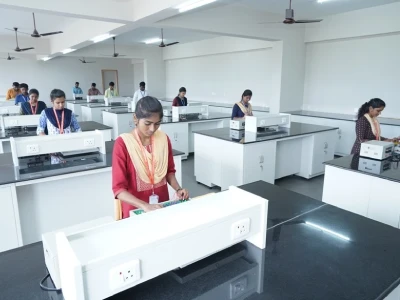
Cutting-Edge Facilities
Access well-equipped research labs, modern analytical instruments, and digital libraries that support your scholarly pursuits and facilitate innovation.

Academic Networking
Participate in conferences, workshops, and guest lectures by leading scientists and industry experts, helping you build connections within the global scientific community.

Vibrant Scholarly Community
Be part of a diverse and motivated research community where peer interaction, knowledge exchange, and academic discourse are encouraged through forums, study groups, and research symposiums.
Spread over 150 acres
At Takshashila University, you will have ample opportunities to hone your skills in real-world healthcare settings, utilising state-of-the-art medical facilities and simulation labs on our 150-acre campus.
Are you ready to begin your journey into the world of physics?
Frequently Asked Questions (FAQs)
What is the duration of the B.Sc. in Physics?
The course lasts for 3 years, divided into six semesters, including theoretical and practical components.
Do I need prior experience in physics to apply?
No, prior experience is not required. The program is designed for those wishing to build a strong foundation in physics.
What career support is available?
We offer career services, including job placements, internships, and networking opportunities to help you secure a job after graduation.

